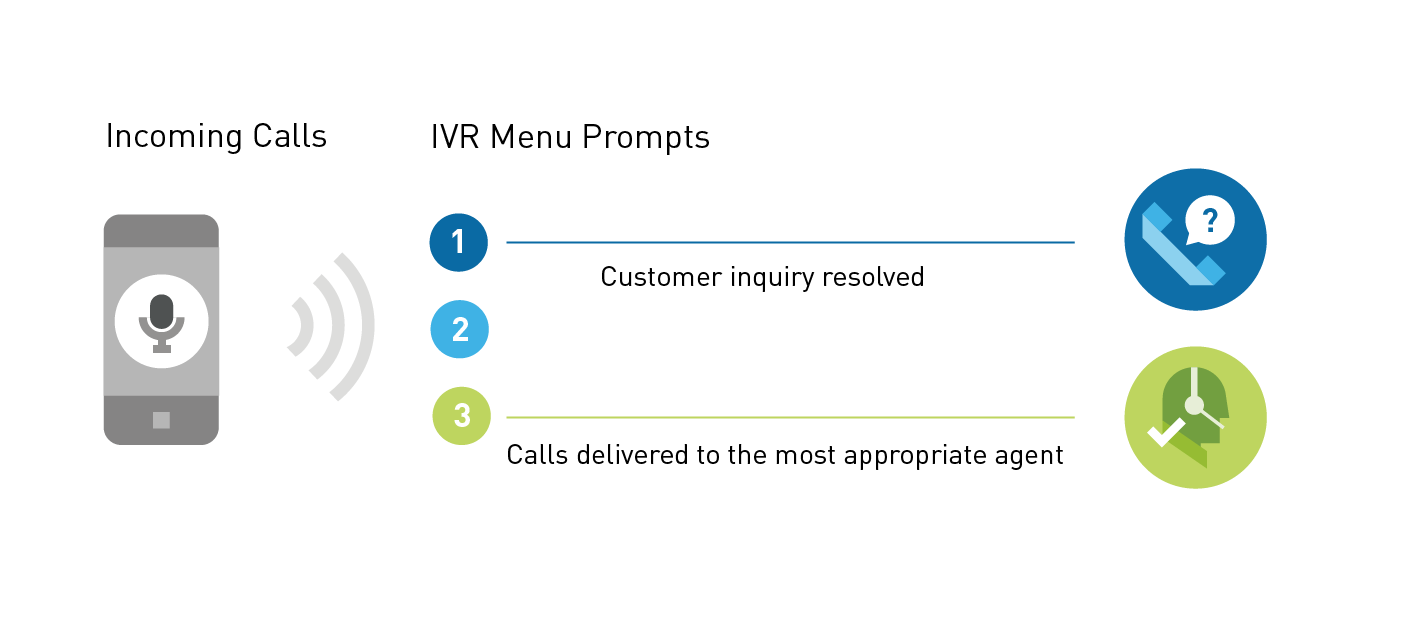Interactive Voice Response (IVR) is an automated telephony system that interacts with callers, gathers information, and routes calls to the appropriate recipient. Some customers have more straight-forward concerns to address (e.g. checking an account balance or paying a bill), so the Contact Center IVR helps these customers self-serve without using up the time of a live agent. And when a customer’s problem extends beyond the dynamic menu, the IVR system can quickly lead the caller to the most relevant agent available.

Key features of IVR
Streamlined IVR Deployment
Design IVRs that have everything you need, via a user-friendly toolkit that walks you through the process step by step. You can use Easy-IVR for new or existing IVRs. With an intuitive interface, guided workflow, and in-context tips, EasyIVR delivers greater ownership for Partners, reduced onboarding effort for customers, and faster time to billing.
CRM Integration
CRM integration helps agents personalize and better resolve customer calls using computer-telephony integration (CTI) screen pops. With integration for Salesforce and most CRM platforms available, the caller information your agent needs becomes automatically available right on their screen.
IVR Data & Call Info
Compiles call statistics on a queue-by-queue basis including total calls queued, handled, abandoned, voicemails, callbacks, min-max and average wait times, talk times, and wrap times. If needed, identifying data from the IVR system (account number, job number, etc.) can be associated with the call.
Outbound IVR Notification
Automated outbound IVR callouts can connect users to a queue to speak to an agent and can be scheduled to ensure you reach customers at a non-disruptive time.
Multi-Lingual Support
Intermedia’s IVR system includes multi-lingual support without the need for additional work or setup. I.e. Instead of setting up three individual call flows for Spanish, French, and English, one call flow can work for all of them.
Private Data Collection
If a user doesn’t want their credit card information to be heard directly by an agent, the Intermedia system allows the agent to transfer that person to an IVR menu to input the information. The agent is kept up-to-date on the caller’s progress, and when input is finished the caller returns to the agent uninterrupted.
IVR Technology and Industry-Specific Use Cases
IVR & Banking
Surprisingly, as online channels have emerged, banking customer satisfaction has decreased. That’s why many banking institutions have become reliant on hosted IVR technology for customer engagement.
Here are some benefits of having IVR technology in financial institutes:
- Customers can check balances and transaction histories
- Customers can make payments and transfers
- Financial Institutes can more effectively interact with customers by having 24/7 business operation
IVR & Medical
IVR systems allow callers (patients) to receive their data quickly and without having to wait for an available representative. This is information that could easily be handled by a person, but the IVR system is used for efficiency and to make sure patients are comfortable getting their health information through a phone call.
- Patients can obtain data and test results relatively anonymously
- Avoids potential embarrassment or sensitive information or test results
IVR & Education
Education is an everlasting, growing industry that can only benefit from IVR technology. By keeping students’ information private and speeding up processes that otherwise could take days, IVR can make all the difference in student satisfaction.
Some IVR use cases for education include:
- Students accessing their student account information knowing their student ID numbers and account information will remain confidential
- Students can conveniently check in on their academic billing and degree progress
- IVR technology can help quickly direct students to student aid and advising services
- Students can check their degree progress and file for graduation without having to wait for an available agent
IVR & Insurance
IVR technology can help callers get consistent and reliable information from their insurance companies to avoid any varying information between insurance agents. With IVR technology, insurance companies are bound to have less failed calls if they are available for contact 24/7.
Some IVR use cases for insurance include:
- Ensured privacy protection
- Customers can call and be able to pay their deductibles and check their copays
- Customers can file claims and check their status on any documents
IVR & Food Service
The food industry heavily relies on phone calls for most of their business. Callers who receive great customer experience are more likely to be returning customers, coming back for a good experience.
Below are some use cases for IVR technology in the food industry:
- Customers can call to find out live wait times
- Customers can check the status of their food and deliveries
- Customers can make reservations without having to wait for an available representative